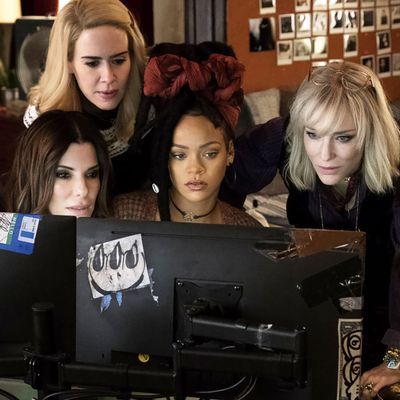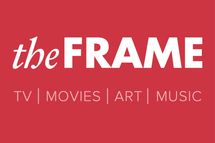
In Ocean’s 8, Sandra Bullock stars as Debbie Ocean, the sister of Danny Ocean played by George Clooney in Ocean’s Eleven, Twelve, and — because Hollywood really can’t resist a sequel to a sequel — Ocean’s Thirteen. This new reimagining of the Ocean’s franchise is directed by Gary Ross and co-written by Ross and Olivia Milch, and stars Cate Blanchett, Mindy Kaling, Awkwafina, Rihanna, Sarah Paulson, Anne Hathaway, and Helena Bonham-Carter. But this isn’t Milch’s first female-centric film: She also wrote and directed the new Netflix movie Dude, which centers on a group of young women who are navigating love and loss in the last days of high school.
“It was something that was born out of my desire to see more authentic representations of young women onscreen,” says Milch. “I wanted to see the young women that I knew who were smart and funny and complex and nuanced, and who was captain of the soccer team and president of their school [council] and also liked to smoke weed in their car! And listen to hip-hop! To paraphrase Walt Whitman, ‘I am large, I contain multitudes.’ That idea that female characters can be many different things and not reduced to the archetype that we tend to see — that was something that was really driving me to tell that story.” To get some insight into Milch’s experience on the groundbreaking Ocean’s 8, John Horn of KPCC’s radio show and podcast The Frame caught up with her before the film’s premiere.

You make a choice by the story that you write. You make a choice by the way that you direct the story, but you also make a choice by the people you hire for your cast and crew on a movie like Dude. You seemed to have a very intentional idea behind that. What did you try to do, and why was it important?
I knew from the get-go that I was going to have a little piece of power, a little opportunity to make sure that our crew was over 50 percent women, our cast was over 50 percent people of color. It wasn’t only because I felt strongly that if I was the person in the role of decision-maker that I was going to make decisions that supported what I felt politically and morally, but also that I knew would make the movie better and would make better art. The set would then feel more representative of the world, and the movie would feel more representative of the world as it is.
Do you think there’s a tangible benefit for you as a writer to take every part of that experience — writing, directing, and hiring on Dude — and how you could apply it to co-writing Ocean’s 8?
Coming from Dude, our little tiny baby indie movie, to going to Ocean’s, this massive studio juggernaut, was such an incredible learning experience for me. It was such a gift. Gary was so wonderful in how generous he was with his knowledge. I was on set every day, sitting by his side at the monitor. I wanted to make sure that we were being true to the story of these women and each one of these specific characters every day, interrogating how this plot and this heist was honoring how special each one of them was and their specific skill set. That’s one of the joys of an ensemble movie like this. [You] really get to spend time with each one of them, and how the parts end up adding up to this incredible whole.
We can say a lot of things about Gary, but we will agree that he is a straight guy and this is a perspective that he has. We talked about this with the director of Blockers, Kay Cannon, who directed a movie written by two guys. It’s about the assumptions and the unconscious bias, about the way that men, even if they’re trying really hard, are going to imagine the way women talk, the way they look, the way they converse — something about their lives that are going to be inauthentic. When you were talking to Gary and representing your point of view, were there things that you found yourself fighting for that you wanted to make sure were reflected in the finished film?
The thing that I really respect about Gary Ross as a writer and as a director, and you can see this in his body of work, is that he has really always told stories about women. The Joan Allen character in Pleasantville, or Hunger Games — I think he is actually someone who comes from a very feminist perspective. We were very much on the same page about that. There wasn’t really anything that was having to be fought for because we were so in agreement. We wanted to make sure that we really spent time with each woman and that we really did them justice in a way that was true to their specific experience.
Which is to say that not all women necessarily have the same experience in the world, and seeing eight women onscreen — period, bottom line, that was a thing that he would sometimes look over at me on set and I would have tears in my eyes. I think it was because I was so awed and so grateful that I was getting to witness this and that audiences would get to witness eight women together onscreen. It’s something I had never seen before. I think those were the moments where it would really dawn on him. It would remind him of how special it was that this was happening, and especially happening at the moment that it was. If there was any sort of difference between us, it was that I was constantly saying, “Do you know how incredible this is?” And he would kind of look at me and laugh!
If you think about what made the Ocean’s Eleven movie successful, a lot of it has to do with the banter between these very prominent actors. How do you make sure that you don’t just take that template and put women in the men’s parts?
The Ocean’s franchise is so incredible. Those are classic films, and, of course, there is the original Ocean’s movie as well with the Rat Pack, which is wonderful. One of the joys of those movies is the camaraderie and the sense of cool, breezy intimacy between these men and what they’re building together and pulling off. One of the things in Ocean’s 8 that was really wonderful was getting to build a little bit more of the backstories between the women. A lot of the women on the team actually know each other. Debbie Ocean, Sandra Bullock’s character, and Lou Miller, Cate Blanchett’s character, have such a steady [relationship]. They ground the movie in a similar way. When you’re with women like these actresses, they bring their own flavor to it. I think a part of what audiences are so excited for with this cast, is getting to spend time with these women. It’s an Ocean’s movie, certainly, and there’s definitely that relationship, but really it’s a group of badass, excellent women who are really good at their jobs and really good at being on the team together.
No movie exists in a time vacuum, and you are developing, writing, and shooting this movie not only after Hillary Clinton loses the presidential election, but also at a moment of the #MeToo movement. Do you think that this movie can, in some ways, be seen in the context of that moment?
Absolutely. I felt like it was almost healing when the trailer came out. People are so excited for what is fun and delightful and kind of glamorous about this movie, but I think it was also this promise that there was going to be almost two hours where they didn’t have to worry that something terrible was going to happen to women. That’s not funny, but at the time it came out, it really felt like we were getting bombarded every day with the reality of the female experience. I don’t think it was surprising to most women, but we were being inundated with that truth. The potential power of a movie like this is that you get to feel the joy and the possibility of the female experience versus a lot of the pain that we had and have been experiencing.
In a perfect world, a movie like Ocean’s 8 is judged solely on its merits, but movies like this, just like the all-female Ghostbusters, are seen — unfairly — as referendums on whether or not women can lead a movie, play action, whatever it is. How do you divorce yourself from thinking about that?
You want to tell the best story, and you want to serve the characters. You’re not as much concerned with, “Will this live up to what people want from a movie about women?” Ultimately you’re telling a story about people and about human beings. We were very excited to have this group of people onscreen together. The fact that it is these eight women and that they are legends. We were just so excited to have the fun and the delight of seeing women steal shit and see them be badass criminals. That was very much the standard that we were trying to hold for ourselves. Is this enjoyable? Is this fun? Is this smart? Is this complicated? That is what was really at the top of our minds when we were thinking about it. My hope is that people come to it for what it is on its own and that we get plenty more movies like this.

